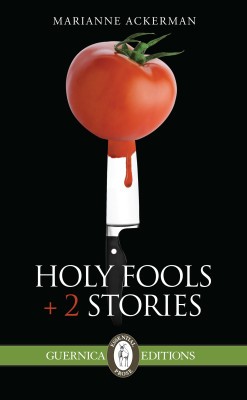Marianne Ackerman, Montreal novelist (Jump, Matters of Hart, and Piers’ Desire), journalist, and playwright, now moves into satire with the novella “Holy Fools,” the first part of Holy Fools + 2 Stories.
The term “holy fool” comes from Saint Paul (“We are fools for Christ’s sake,” 1 Corinthians 4:10) and usually refers to a person who gives up all his worldly possessions to live the holy life. Ackerman turns this notion on its head and provides two fools for our consideration.
As befits a man who recognizes that he offers nothing to the world, Peter Wright’s life only moves forward by being buffeted and bounced around by external events. He has come to the conclusion that the only way to render it interesting would be by making “a well-planned exit” – suicide. It has taken him a year to prepare. And wouldn’t you know it, like everything else he has done, it fails. Instead, he is accused of murder. But, in a flash of insight, he realizes the solution he craves is right in front of him: prison. There he would have the security he seeks – three meals a day, a roof over his head, and no worries – just a comfortable routine and virtual anonymity. He pleads guilty.

Holy Fools + 2 Stories
Marianne Ackerman
Guernica Editions
$20.00
paper
184pp
978-1-77183-002-7
Here we have two sides of the holy fool coin: Peter, who gives up everything while professing guilt, and Tolstoy, who declares himself blameless while trying to keep everything and acquire more.
The satire in “Holy Fools” is pointed, not broad. It starts out a bit too darkly, though this is necessary for the plot, and is a little choppy in the first pages. But Ackerman hits her stride in the prison scenes, and the rest of the story is smoother. The pace is fast, and there are a few sections that might have been milked a little longer for their ironies. Still, Ackerman has her fun, and the reader is rewarded regularly with moments of delicious archness.
The accompanying two stories, “No One Writes to the Professor” and “Albert Fine” couldn’t be more different. The first draws its inspiration from “No One Writes to the Colonel,” a Gabriel García Márquez story, and in it a Spanish teacher and would-be economist ponders his failure to write his PhD thesis – and all that could have been if he had – as he makes his way to live with his sister in Poland. It is a sad, introspective tale of a man who is struggling with his feelings of responsibility for the bad choices he has made. “Albert Fine” is the more straightforward story of a mentally “slow” hired hand and the family he works for. Set in the early 1960s, it depicts a hardscrabble rural life and the dire consequences of suspicion fuelled by misunderstanding. But it is “Holy Fools” that really stands out as the most daring of the three. mRb






0 Comments